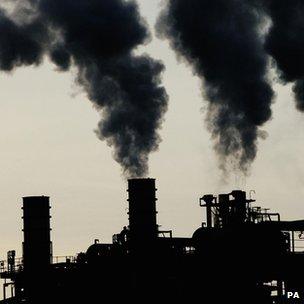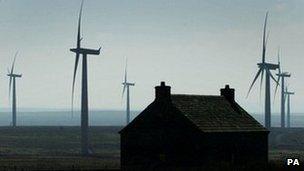Climate consensus cracking open - or not
- Published
- comments

Is there a need to panic about greenhouse gas emissions - and are we doing so?
Is there or isn't there a scientific consensus on climate change?
And does it matter?
What's brought me here now is the letter published in the Wall Street Journal (WSJ), external about 10 days ago, in which a group of 16 scientists declared there was "no need to panic on global warming".
"A large and growing number of distinguished scientists and engineers do not agree that drastic actions on global warming are needed," it says.
In other words - in a meme that's become very familiar over the last few years - "the consensus is cracking".
It's a troublesome meme in several ways.
First, and most obvious, is the absence of any evidence that it's actually true. Certainly, since the "ClimateGate" affair there's been criticism from within the scientific community about the practices of some climate scientists - but that's very different from disputing their broad conclusions.
A letter to the Financial Post, external newspaper in 2006 protesting against the "consensus" was signed by 67 scientists, another to the UN, external in 2009 was signed by 141, while the latest garnered just 16 - and was met by a riposte, external bearing 37 names.
The numbers tell you precisely nothing of value.
A second problem is the absence of clarity over which consensus we are talking about; consensus that the Earth is warming, consensus that greenhouse gas emissions are the main reason, or consensus that it's a problem requiring urgent solution, to name but three?

Warming waters and pH changes may threaten ocean life - but will projections come true?
Thirdly, is the fact that it may not matter very much.
A couple of years back, at one of the UNFCCC meetings in Bonn, I had a long chat with Viscount Monckton. As a scholar of Classics, he was able to detail with Classical derivation the reasons why consensus matters far less than simply being right.
And he is surely correct; after all, in more recent times, Galileo, Darwin, Einstein and Hawking are among those whose work broke with the consensus, yet turned out to be correct.
But if the presence of a consensus is irrelevant, so, logically, is its absence; which makes the continued use by sceptics' groups of the "consensus is cracking" meme a bit mystifying.
After all, how many times can you say it's cracking before people start asking "so why hasn't it cracked, then?"
In both cases - consensus and breaking consensus - it's surely the evidence that should count, not the number of people you can get to sign your letter.
In interpreting the various letters that have claimed to see signs of the crack, it's also important to be very clear about what the people signing them are and aren't saying.
In 2007, for example, I wrote a series of articles, external loosely based on the letter to the Financial Post, and found that among its signatories there were widely divergent views about which aspects of the "consensus" they disagreed with.
One, Gordon Swaters from the University of Alberta, went as far as to retract his signature, external saying he had thought he was signing something asking for more research on climate change, rather than denying its existence.
"Clearly the agony of having stupidly signed that damn first letter will not abate," he told me at the time.
"I am not a climate skeptic... anthropogenic climate change is clearly occurring (and) it is likely the case that most of the observed warming over that 50 years or so is the result of human activities."
Finding the name of a Cambridge University engineering professor, Michael Kelly, on the WSJ letter, I decided to get in touch and find out his reasons for signing.
His basic position is that the kind of energy transformation through which the UK, for example, is planning to go is really tough to achieve in engineering terms, and would be financially ruinous.
To meet the goals of the Climate Change Act, external (notably an emissions cut of 80% from 1990 levels by 2050) he argues that "we'd really need a command economy of the kind we had in World War 2 if we were really serious about meeting the targets in full.

The rush to renewables is largely driven by hot air, Prof Kelly believes
"What we need to do will bankrupt us if we really go for it and ignore the rest of the world."
He would, he says, still endorse the rapid transformation if he thought the scientific evidence for needing it was compelling.
"Are you convinced that the world's going to hell in a handbasket on the basis of the predictions and what's been happening for the last 10 or 12 years?
"The answer is simply 'no'.
"I look back 300 years and I find that the temperature went up by more than it's gone up recently - in Central England, external from about 1699 to 1729 it went up by nearly 2C - and nobody said that was carbon dioxide."
(UPDATE: The full CET time series is graphed here, external, while one of the original science papers on analysis of its early years is here, external)
Other components of his argument are that money is better spent on aid to Africa than on a dash to renewables, that higher CO2 levels will boost plant growth, that current climate models are not trustworthy - in particular, because they project an acceleration of warming whereas over the last 17 years we have seen a deceleration - and that wind turbines may be left derelict in future when the cost of replacing the nascelles proves uneconomic.
He also cites a recent study on ocean acidification, external showing that natural short-term variability in ocean pH is greater than the change in the average projected to occur over the next century or so.
And he has a bet with other Fellows of the Royal Society that temperatures during the current decade will be lower, on average, than during the preceding one, the stake being a case of wine.
All of the points above are challengeable, and - playing Devil's advocate - I did challenge him on some.
What we agreed on is that formulating climate change polity is first and foremost a question of risk judgement.
In Prof Kelly's view, the risks of rushing into a low-carbon future, as opposed to taking the transition more slowly, outweigh the risks of not doing so; hence the WSJ article's title, "No need to panic".
I'm sure his arguments will find favour with many regular readers, and equally infuriate many others who contend that political leaders aren't panicking enough.
But it is surely the arguments themselves that ought to be the focus for discussion - not what they purport to say about a cracking consensus.